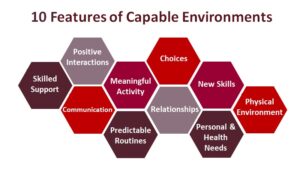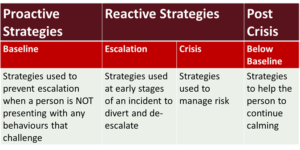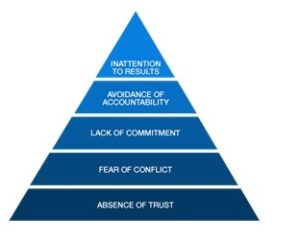Being a service manager or team leader is a challenging job, but we know that if you’re able to establish PBS in your services, it will make things a little easier for you, as well as achieve better outcomes for the people your service supports. So, we’ve pulled together some PBS Top Tips and resources to help.
1. Make sure you are familiar with the framework of Capable Environments
This is a term used to describe environments that are capable of meeting the needs of people supported within them. Leading to higher quality of life and resulting in reductions of behaviours of concern. There are 10 elements to Capable Environments, and you can access a free video we created here
2. Make sure that your team understand the framework of Capable Environments
Your team needs to understand that all the things they do, all the different choices and activities they provide, as well as strategies for communication, all fit within this framework. Understanding this can help them to see the bigger picture, which is hard when you are supporting someone for several hours a day. Share the video with you team and discuss it.
3. Team understanding of PBS
Make sure that your team has at least an awareness level understanding of PBS and how it relates to the support that they provide. Read our blog on what is PBS here to support your team. You can also arrange a one day Introduction to PBS for your staff team.
4. Team understanding of proactive and reactive strategies
Ensure that your team know the difference between proactive and reactive strategies. We often find that teams can focus too much on what they need to do when the behaviour of concern is present, these are reactive strategies. This is understandable, because this is the point at which the person, and those around them, risk being hurt. However, proactive strategies, the things you do when the behaviour is not present, are the ones which will reduce the likelihood of the behaviour happening again in the future; reactive strategies will not.
5. Review the reactive strategies
Reviewing the reactive strategies used by your team, can identify a number of issues, which if resolved can reduce the likelihood of a behavioural concern escalating to crisis point. Some key points you might want to check are:
- Do all your team understand the stages of the arousal cycle?
- Are the current strategies, described in the PBS plan at each stage, correct for that stage?
- How effective are the current early-stage strategies at de-escalating behavioural issues?
- Are your team responding with empathy during an incident?
- Are there times when a restrictive strategy is used, where a non-restrictive strategy could have been used instead?
6. Think about any issues within your team
Teams are complex systems. We often wonder why there are so many issues in team working, but really, it’s not that surprising. Teams are often made up of people who are very different from each other; they all bring their own issues and perspectives on life and work; and they all bring their own unique talents as well! Getting the team to pull together in their support approach is critical to the success of PBS. We have found a really useful framework for improving team functioning, and you can read a short blog on it here.
7. Trouble shoot solutions to the team not following the PBS Plan.
When a team supporting someone does not follow an agreed plan, it can be frustrating, confusing and at times worrying. This can happen whether you are working in adult supported living or residential services. It’s easy for both the person who is responsible for getting plans into place, and the staff teams tasked with implementation, to get into the ‘blame game’, with both sides blaming the other for failure. Check out this short blog here and three actions you can take.
For further training
PBS Toolkit for Service Managers & Team Leaders
We have a PBS Toolkit e-learning, specifically for service managers and team leaders. It includes further support and resources. This e-learning course is sold via an organisational licence based on number of users. You can get a sneak peak of the content here.
PBS Coaching in Practice Programme

This programme includes the PBS Toolkit discussed above, plus 4 days training focussed on developing additional PBS knowledge and assessment skills. On completion of the programme. You can find more details here.
Get in touch with us at info@redstonepbs.co.uk or call 0161 864 2160 if you would like to explore either of these options further.
If you’re interested in receiving further blogs or information about PBS, training and offers to your inbox click here.
Author
Kate Strutt – Director of Redstone PBS and Clinical Psychologist.
Kate has over 20 years’ experience of working with adults and children with intellectual disabilities and those who are autistic, both within statutory services and the independent sector. Kate is registered with the Health and Care Professions Council. Bsc Psychology, D.Clin Psyc, MSc Applied Behaviour Analysis.













